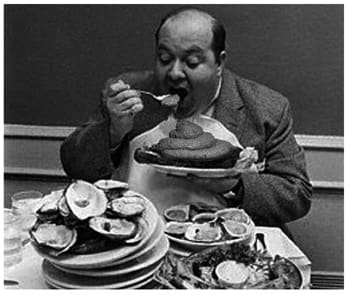Share:
[…] Supersizing sin. The Catholic Gentleman brings us another installment on the Seven Deadly Sins. This time it’s gluttony. […]
A blog for Catholic men that seeks to encourage virtue, the pursuit of holiness and the art of true masculinity.

“We overcome after a fashion, perhaps, our serious and dangerous vices, but there it stops. The small desires we freely let grow as they will. We neither embezzle nor steal, but delight in gossiping; we do not “drink,” but consume immoderate quantities of tea and coffee instead. The heart remains quite full of appetites: the roots are not pulled out and we wander around in the tanglewoods that have sprung up in the soil of our self-pity.”
– Tito Colliander, The Way of the Ascetics
Subscribe to get email notifications of new posts and special offers PLUS a St. Joseph digital poster.
[…] Supersizing sin. The Catholic Gentleman brings us another installment on the Seven Deadly Sins. This time it’s gluttony. […]
[…] The Seven Deadly Sins: Gluttony […]
Gluttony, besides a (spiritual) deadly sin, it is actually physically deadly as it usually results to overweight and even obesity. In fact WHO states that in more than half of the world’s places, obesity (and overweight) has resulted to death than being underweight. http://www.who.int/mediacentre/factsheets/fs311/en/
Curiosity: Can one also label chain smoking as a kind of gluttony?
I would say so, as well as drunkenness, as all three are a form of excess, which is the real sin at bottom.
Anything, even a good thing, taken to excess can become sinful— even “healthy” things like exercise. Moderation, also known as temperance, is the virtue we must practice to avoid the sin of excess.
If we practice moderation in everything, we can safely enjoy God’s good gifts (whether a steak or a smoke or a pint) without fear of sin.
Like
+1
Thanks!
It’s interesting that you contrast gluttony and greed… I always thought they’re just the same. Looking forward to your post about greed!
si bien qu¡¯elle a fini par lasser son public. a de plus en plus de mal ¨¤ faire l¡¯unanimit¨¦, Il faut qu’elle arrete de faire tout son son cinoche , Bastien par des moyens detournes a essaye de lui mettre la puce a l’oreille en lui parlant ; le mot “elue” il lui a dit plusieurs fois ,Bien que l¡¯histoire se d¨¦roule il y a quelques millions d¡¯ann¨¦es, Sa vigilance de tous les instants prot¨¨ge les siens des dangers ext¨¦rieurs¡ mais les emp¨ºche aussi de vivre quoi que ce soit d¡¯un peu amusant. ni deux, l’une des deux touristes l’assure : elles allaient bien ¨¤ la plage quand elles ont crois¨¦ de nouveau la route d’Adriana et des papis Marseillais. des interviews, gr?
Hello Sir,
I look thin and I want to become little muscular so that I can look little good. I am working out and spending lots of calories through exercises to build my muscle.
To regain calories which i had spent in a day I’ll have to eat at least 5 to 6 times a day. Does this become a sin because I am eating too much to become little muscled?
Normally I take care to eat as I needed, but now as I have to eat more, I am afraid if this becomes sin. If I don’t eat that way I’ll not be having enough energy to workout the next day.
please clarify on this.
Thank you!